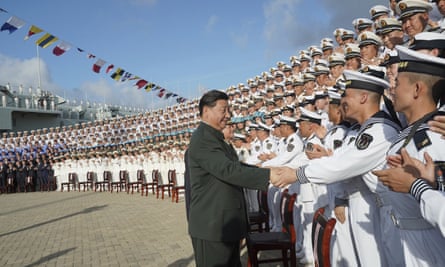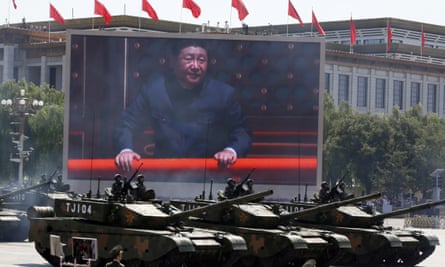It’s often said that power corrupts, and absolute power corrupts absolutely – but does it also induce leaders to act in foolhardy, headstrong and ultimately self-destructive ways? History, especially Chinese history, is full of examples of omnipotent rulers whose unchecked behaviour led to disaster. Xi Jinping, China’s comrade-emperor, is a modern-day case in point. Xi seems to think he can do no wrong. As a result, not much is going right.
Xi’s authoritarian, expansionist policies, pursued with increasing vehemence since he became communist party chief and president in 2012-13, have enveloped China in a ring of fire. Its borderlands are ablaze with conflict and confrontation from Inner Mongolia, Xinjiang, Tibet and the Himalayas in the north and west to Hong Kong, the South China Sea and Taiwan to the east. More than at any time since Mao’s 1949 revolution, China is also at odds with the wider world.
It’s not all bad news. China’s manufacturing heartlands are recovering quickly from the pandemic. The IMF predicts 1.2% growth this year and above 5% annually thereafter, well ahead of other major economies. Yet there is evidence that a widening wealth gap is weakening social cohesion. The rich-poor divide is symbolised by Xi, whose unaccountably large personal fortune is put at $1.5bn. Meanwhile, the pandemic, which originated in Wuhan, has seriously damaged China’s reputation abroad.
A leader bound by conventional political and institutional checks and subject to public scrutiny might be expected to pause and take stock at such a moment. But in regimented, censored and heavily surveilled one-party China, Xi faces few such constraints. Instead, he is doubling down on an ultra-nationalist agenda, indefinite one-man rule and ideological conformity, as defined by him. It’s rumoured he may soon declare himself “Chairman Xi”.
 Xi Jinping meets the crew of an aircraft carrier at a naval port in Hainan province last December. Photograph: Li Gang/AP
Xi Jinping meets the crew of an aircraft carrier at a naval port in Hainan province last December. Photograph: Li Gang/AP
Xi’s instructions to party cadres in Tibet last week typify his hardline approach to ethnic minority tensions affecting China’s periphery. He called on them to build an “impregnable fortress” to guard against “splitism”, or separatism, and ensure frontier security. He also insisted on further subjugating Tibetan Buddhism to socialist principles. This in a stolen land that has endured decades of “Sinicisation”, forced assimilation, and large-scale Han Chinese immigration.
Chinese rule in Tibet is an often-neglected 70-year story of occupation, repression, killings and self-immolations, imprisonment, destroyed monasteries and, more recently, shredded Buddhist prayer flags. The 2019 US state department report on religious freedom highlighted ongoing “forced disappearances, arrests, torture, physical abuse, including sexual abuse, and prolonged detentions without trial”. By any reckoning, these are crimes against humanity.
According to the Tibet activist Kelsang Dolma, oppressive measures practised in Tibet were the template for more recent actions taken against Uighur Muslims in Xinjiang. “Chen Quanguo, then a rising star, arrived in Tibet as the new [Chinese communist] party secretary in 2011 and rapidly transformed Tibet into one of the most pervasive police states in the world,” Dolma wrote. “In 2016, Chen became Xinjiang’s party secretary … bringing techniques practised on Tibetans to Xinjiang.”
Horror stories continue to emerge from the province, where up to a million Uighurs and other Muslim minorities have been incarcerated for “extremist” activities such as praying. In June came reports of a campaign of forced sterilisation, contraception and abortion aimed at cutting the Uighur birth rate. Last week, testimony about state-ordered hysterectomies performed on Uighur women was broadcast on television. These are crimes against humanity, too.
Xi’s obsession with total obedience, conformity and security provoked another backlash last week. Street protesters in Hohhot, capital of Inner Mongolia, and other cities denounced official moves to limit the use of the Mongolian language in schools. “Mongolian is our mother language! We are Mongolian until death!” students shouted. Inner Mongolia declared itself an independent republic in 1945. It lasted two months. The idea evidently lingers.
Xi's ruthless methods are stimulating rather than reducing domestic resistance
As in Tibet and Xinjiang, Mongolian unrest reflects wider hostility to the attempted absorption of ethnic minorities into dominant Han Chinese culture, a central tenet of Xi’s pursuit of a common national identity. Yet it also suggests that despite all the coercive tools at his disposal, his ruthless methods are stimulating rather than reducing domestic resistance.
Xi’s willingness to defiantly double-down when challenged has been keenly felt in majority Cantonese-speaking Hong Kong, too. The imposition earlier this year of a draconian Chinese state security law effectively threw down a gauntlet to Britain and the international community. There were many angry words, but nobody actually picked it up.
Now Hong Kong’s cherished democratic freedoms are swiftly being eliminated.
And then there is de facto independent Taiwan, the “renegade province” Xi threatens to seize by force. China is steadily increasing military pressure on the island. Some dismiss this as sabre-rattling. But encouraged by the west’s tame surrender of Hong Kong, Xi may yet dump Beijing’s failing policy of gradual, peaceful reunification. He may calculate instead that Donald Trump’s chaotic America, busy fighting itself, will not come to Taiwan’s defence. That could bring calamity.
Why is Xi behaving so aggressively? Perhaps he genuinely fears for the country’s internal security, cohesion and unity as it evolves into a global superpower. Cai Xia, a Beijing professor expelled from the party for criticising Xi, likened him to a mafia boss. His centralisation of power and purging of party rivals had made him a more formidable figure than Mao, she said, but he still felt insecure.
Or perhaps Xi does what he does simply because he can – because he’s lost sight of the national interest and ideas of justice and equality, and covets a personal legacy as the great unifier of the new China. There’s nobody to stop him, nobody to say “no”.
It’s the blindness and hubris that comes with absolute power. It usually ends in tears.
Since you're here ...
… joining us from India, we have a small favour to ask. You've read
30 articles in the last year. And you’re not alone; millions are flocking to the Guardian for quality news every day. We believe everyone deserves access to factual information, and analysis that has authority and integrity. That’s why, unlike many others, we made a choice: to keep Guardian reporting open for all, regardless of where they live or what they can afford to pay.
As an open, independent news organisation we investigate, interrogate and expose the actions of those in power, without fear. With no shareholders or billionaire owner, our journalism is free from political and commercial bias – this makes us different. We can give a voice to the oppressed and neglected, and stand in solidarity with those who are calling for a fairer future. With your help we can make a difference.
We’re determined to provide journalism that helps each of us better understand the world, and take actions that challenge, unite, and inspire change – in times of crisis and beyond. Our work would not be possible without our readers, who now support our work from 180 countries around the world.

No comments:
Post a Comment